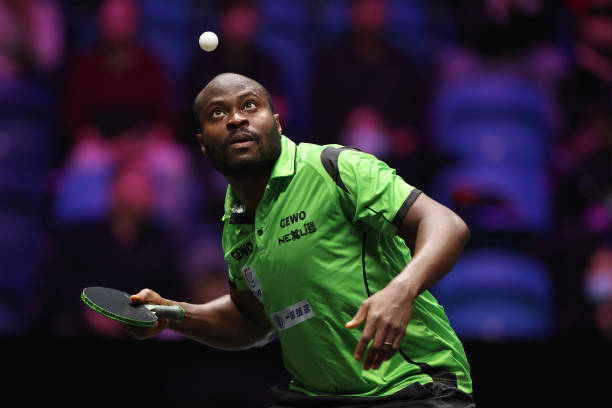By Johnson Opeisa
The resilient progression of table tennis in Africa has largely been sustained by Nigeria and Egypt. These two nations have led the continent’s global presence, producing generations of elite players who compete toe-to-toe with their counterparts in Europe and Asia, the regions where the sport has flourished since its inception. For Nigeria, Quadri Aruna has been the face of this dominance in recent years. And as the inevitability of his retirement looms, a new wave of emerging talents from his ranks are in the making to carry the baton.
But so much of Nigeria’s table tennis legacy predates Quadri and the generation that would follow him.
The Origins of Table Tennis in Nigeria
Like most other sports that have become an identity and culture on the continent, colonial influences played a significant role in the adoption and growth of table tennis in Africa.
Egypt was the first country to take a place at the forefront of table tennis on the continent when it launched a landmark bid to host the World Table Tennis Championships in 1939—the first time the event was held outside Europe. Nigeria, like the rest of the continent, initially lagged behind the North Africans. The country was absent from the historic 1939 championship, likely due to the uncertainties that stemmed from the imminent World War II at the time.
However, in the years following the war’s twilight, from the late 1940s into the 1950s, table tennis gradually gained traction within Nigeria’s football-centric sports terrain. Club competitions flourished in Lagos, the then country’s capital, with areas like Obalende, Lafiaji, Faji, and a large chunk of the Island serving as the cradle of the local movement. This movement gained a more structured outlook with the formation of the Lagos and District Table Tennis Association in November 1949.
Two years later, table tennis was further institutionalised with the establishment of the Nigerian Table Tennis Federation (NTTF), which was first headed by Jack Farnsworth, the English expatriate whose commitment to tennis development in Nigeria runs back to the formation of the Lagos association.
The NTTF’s formation under Farnsworth paved the way for the inaugural international table tennis competition in 1951, heralding the first generation of elite players to emerge from Nigeria.
Nigeria’s Table Tennis Vanguards
The growth of table tennis as both a recreational activity and a professional sport in Nigeria was in tandem with secondary schools in its early days. By 1953, the first edition of the inter-school table tennis competition took place, with Eko Boys High School emerging as the winner.
Lagos, being the springboard of table tennis in Nigeria, naturally produced early stars, but the sport also flourished outside the state as time passed. Among the talents discovered outside the Centre of Excellence was Atanda Musa, popularly known as Mansa Musa. He caught the table tennis bug while in school at Ijebu Ode and quickly rose through the ranks, representing the Ijebu zone and the Western State when Nigeria still operated a 12-state federation.
Revered as Nigeria’s greatest table tennis player by many who followed, Musa’s acrobatic, two-winged loop and spectacular backhand endeared him to fans. He commanded a cult-like following uncommon among his peers, fueled by his fierce rivalry with another Nigerian table tennis great, Yomi Bankole. The tales of their rivalry linger on the lips of many, with the dramatic final of the 1984 Asoju Oba Cup at the Teslim Balogun Stadium etched as one of the rivalry’s most iconic moments.
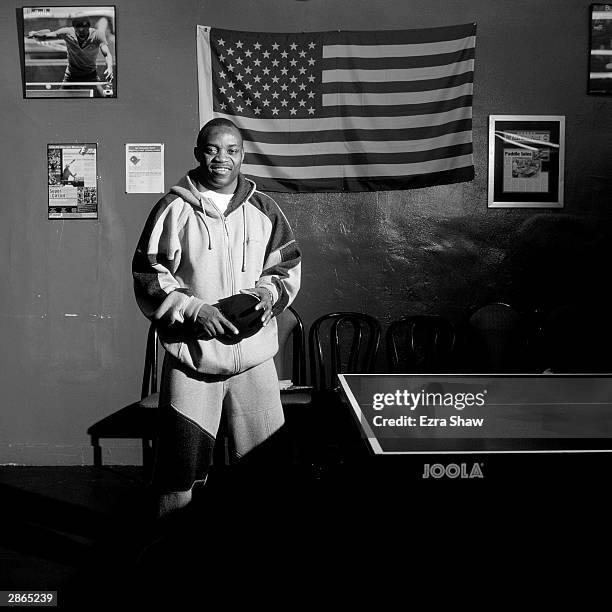
Musa would go on to become the first African to break into the top 20 of the world rankings, spending about 15 years with the national team and amassing 10 African Men’s Table Tennis Singles Championships. He also appeared in two Olympic Games and later transitioned into the coaching side of the sport, with stints at Saudi Arabia and the United States, where he currently resides.
In the same ilk as Musa’s rise from secondary school tournaments, Babatunde Obisanya is another legendary figure whose discovery can be credited to the secondary school circuit before he made his mark and rose through the national team ranks up to the coaching pedestal.
On the other side of the spectrum, Mabel Segun led the charge for female representation. Before her passing in January 2025, Mabel committed her early life to the sport, laying the groundwork for women’s involvement. This path started with her fairytale run in the inaugural women’s singles event at the 1954 National Singles Championships, where she narrowly lost to the wife of an expatriate.
Essentially, the mid-20th century was a pivotal era in Nigerian table tennis, marked by a unique confluence of players and administrators whose contributions blazed the trail for future stars. Their efforts, in hindsight, laid the foundation for the sport’s golden era in the nineties and noughties.
Nigeria’s Table Tennis Golden Era
From the turn of the 20th century until the present day, Nigerian table tennis has seen a sequence of remarkable players whose careers have furthered Nigeria’s reputation as a table tennis powerhouse.
Among a plethora of names that ideally come to mind, the trio of Funke Oshonaike, Segun Toriola, the old-guards of the era, and the quintessential Aruna Quadri stand out as the brightest, not only for their on-court achievements but also through their longevity in the face of increasingly competitive opposition.
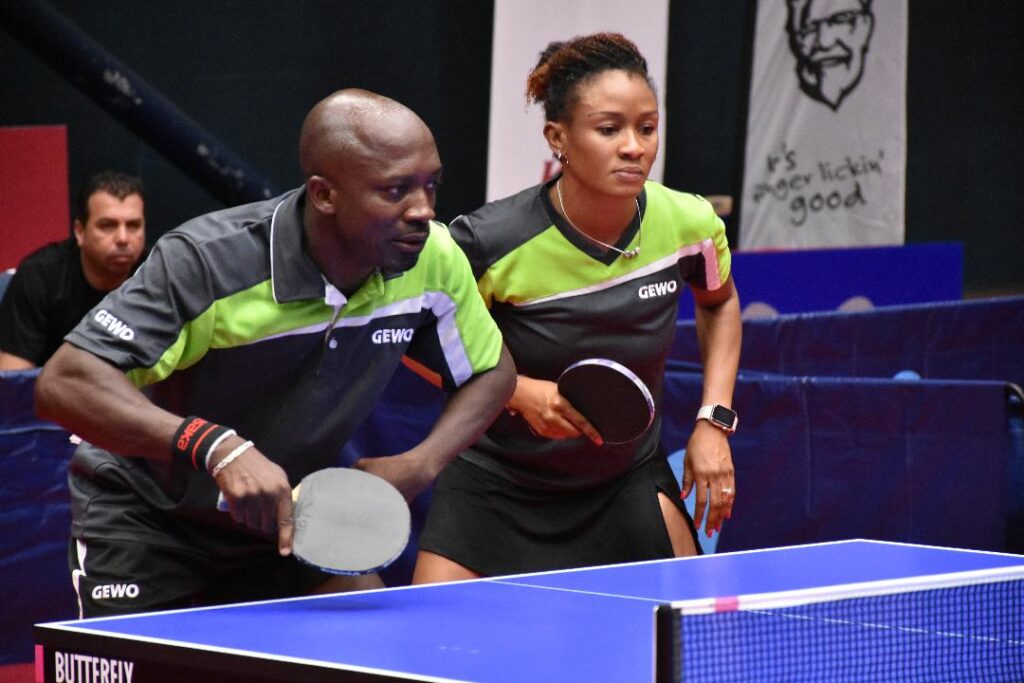
Segun Toriola and Funke Oshonaike
No discussion of Nigerian table tennis legends is complete without Funke Oshonaike, the Lagos-born paddler who became a national champion at 16 and went on to claim 25 national titles, 11 African Games medals, and three continental championships over three decades. Her appearance at the 2020 Olympics at age 45 made her the first woman globally to join the prestigious “Seven Club” — an elite group of just five players with seven Olympic appearances. Among them is Segun Toriola, the Ilorin-born star who became the first African to achieve the feat in 2016. Africa’s top-ranked paddler from 1998 to 2008, Toriola competed at an elite level until retiring in 2020 at age 46.
Before stepping away from the game, he shared the spotlight with the reigning face of modern African table tennis, Quadri Aruna. The duo competed in several international tournaments and also partnered in some of the men’s doubles events, winning the title at the 2016 ITTF Africa Senior Championships and reaching the quarterfinals at the 2018 Commonwealth Games.
For much of Nigeria’s table tennis scene over the past two decades, Aruna has been its undisputed figurehead. The 36-year-old has continually pushed the boundaries of greatness, surpassing the benchmarks set by his predecessors. Since making his mark as a cadet player in the early 2000s, Aruna has been on an upward trajectory, leaving behind a trail of titles and medals at every stage he graced.
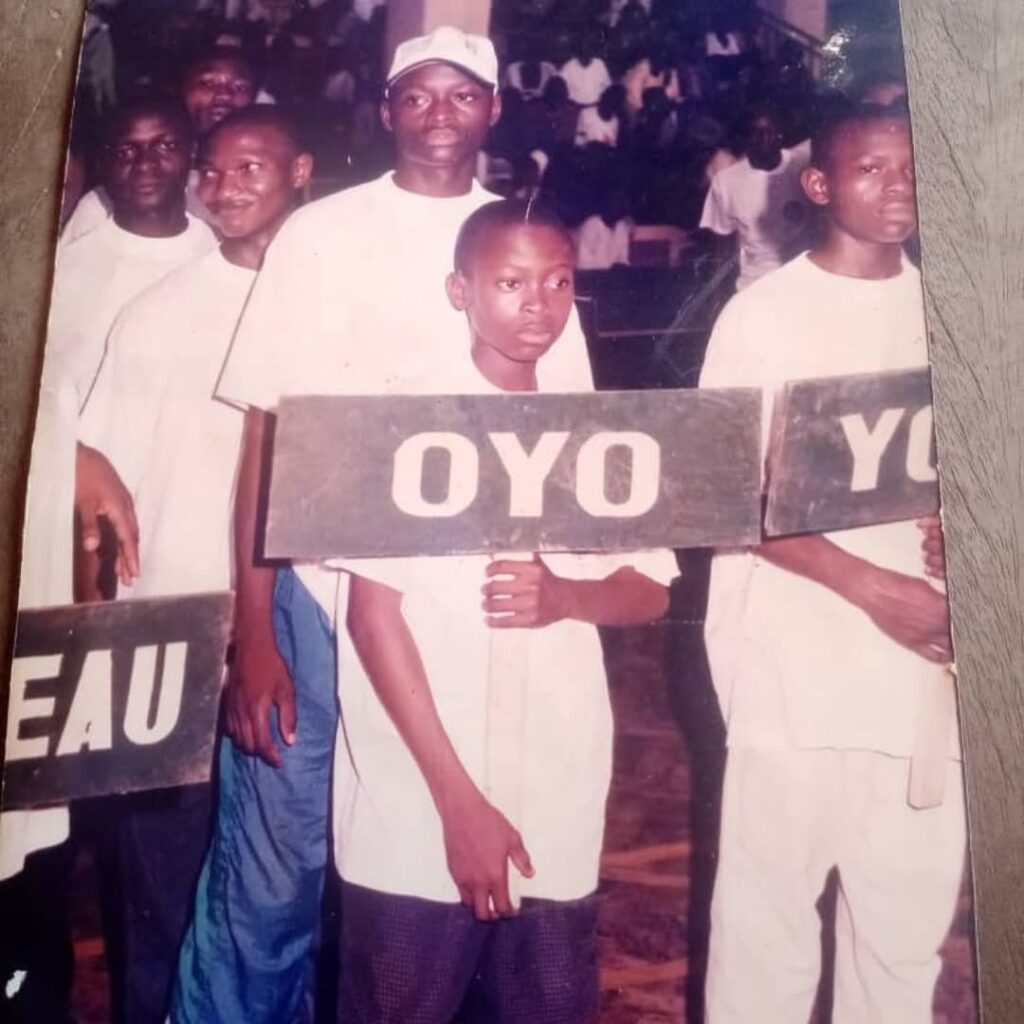
Young Quadri Aruna
On the global stage, the Oyo-born paddler has represented Nigeria at four consecutive Olympic Games. His international profile soared in 2016 when he reached the quarterfinals, becoming the first African table tennis player to achieve that feat. Aruna’s meteoric rise continued as he set a series of African firsts: the first to break into the ITTF global top 15 in 2021 and later the top 10 in 2022.
He has since remained a regular in the top 20, consistently holding Africa’s number one position while locked in a fierce rivalry with Egypt’s Omar Assar. Assar has proven to be a worthy adversary, battling neck and neck with Aruna for Africa’s top-ranked spot — a rivalry that ensures Aruna’s illustrious career is winding up in perhaps its most competitive and resplendent stride yet. Ultimately, though, the true measure of his epilogue may lie in the next generation of stars he has been grooming with his wife, Ganiyat, a former table tennis player herself.
The Arunas’ Growing Tennis Dynasty
The names Mariam, Aruna Junior, and Amira Quadri are now an open secret in table tennis circles. On the night their father made it to the semi-finals at the World Table Tennis Contender in Doha (a 2x African record he holds), the Aruna kids made podium appearances at the VIX Joao Monteiro Table Tennis Tournament in Portugal under the tutelage of their mother, Ganiyat.
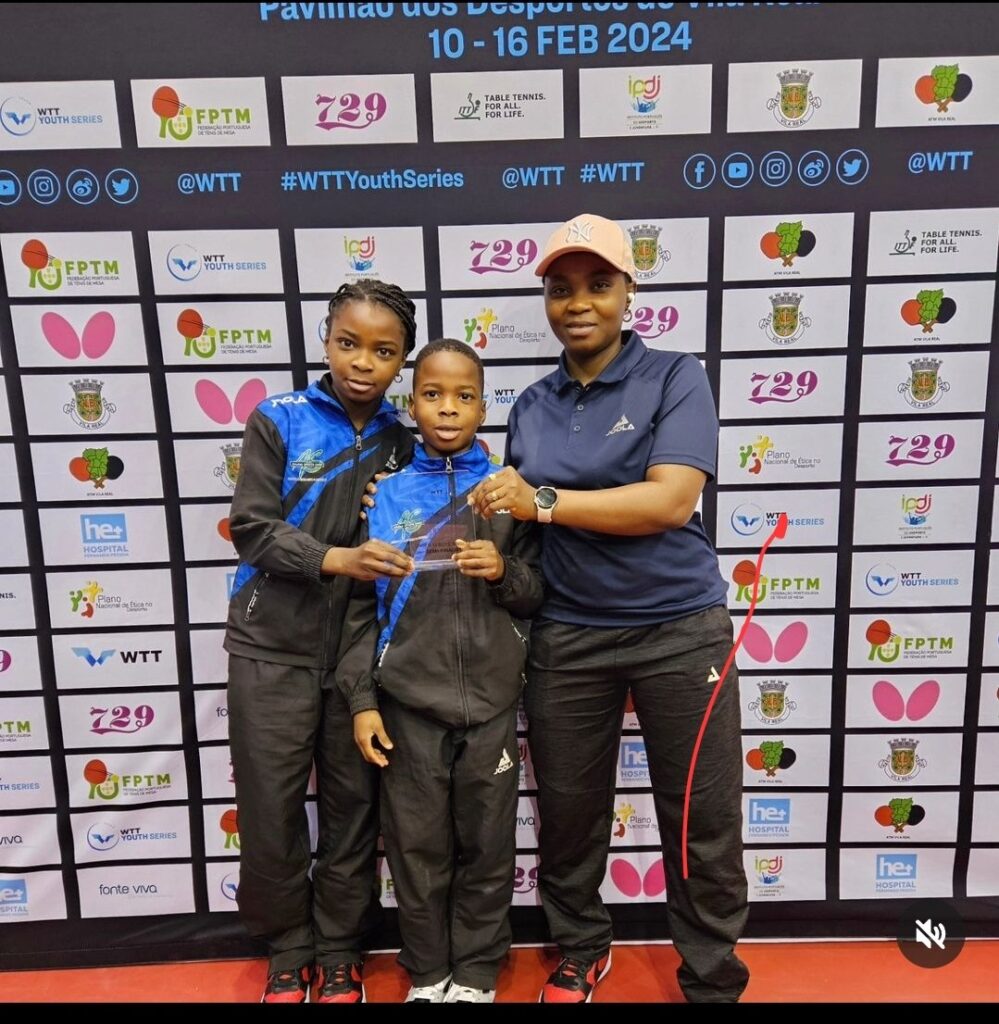
Mariam, Quadri Jr. and Ganiyat Aruna
The tennis couple’s eldest, Mariam, won a silver medal in the U15 Girls’ event, while Aruna Junior bagged a silver in the Boys’ U11 category. The youngest, Amira, secured a bronze in the U11 Girls’ event.
Sports scions aren’t common in the Nigerian sports ecosystem. Even in cases where they are, emerging from a lineage of luminaries has never been a guarantee of sustaining a legacy at its peak. However, the Arunas appear to be raising their children with a clear sense of purpose, ensuring that the next generation has a structured path to excellence.
Like Father like son 🏓🏓
— Making of Champions (@MakingOfChamps) February 4, 2025
Even in practice, Aruna Quadri does not show his son any mercy, celebrating every point he makes against the boy like it was a proper match.
Trailing his father's paths, the young Aruna is destined for the top 🙌🙌pic.twitter.com/VLmuDgdG0P
“It is a decision between me and my husband to allow our children to do sports to keep that legacy,” Ganiyat told Daily Trust.
“Whenever I was going for training, I always took them along. I started with Mariam, and that was how she got into the sport. Some years later, I began training Junior as well.”
In addition to guiding their children’s path, the Arunas are actively preserving Nigeria’s table tennis legacy through the Aruna Sports Club and Academy (ASCA). Founded in 2019 by Quadri and managed by Ganiyat, the institute is dedicated to discovering and refining raw talent, all in a bid “to leave a lasting legacy,” Ganiyat emphasised, “for when my husband retires from professional table tennis.”
ASCA currently operates two training centres: one in Surulere, Lagos, and the other in Gwarinpa, Abuja. The academy’s web records place student enrollment at over 23,600 across beginner, intermediate, and advanced levels. It also offers specialised sessions for veterans aged 40 and above. The academy’s coaching team is made up entirely of former table tennis players, including Ganiyat Aruna.
The academy periodically rolls out age-grade championships to keep students competitively active. It also participates in local tournaments, with appearances at events such as the Daniel Ford International Elite Youth Invitational, National Table Tennis Championships, Elicris TT Cup, and more. Beyond the academy, the Arunas also run another family offshoot venture, the Aruna Sports Shop, a tennis retail outfit that also doubles as a partner for some of the academy’s training and related initiatives.
Ultimately, the Arunas are a significant pillar of Nigeria’s table tennis status to date. Quadri’s timeless career has filled a significant gap in the sports locally, and with his family’s initiatives carrying the torch forward, the legacy is undoubtedly in safe hands, though it could do with a more intentional approach from the NTTF and other established figures in the space.

